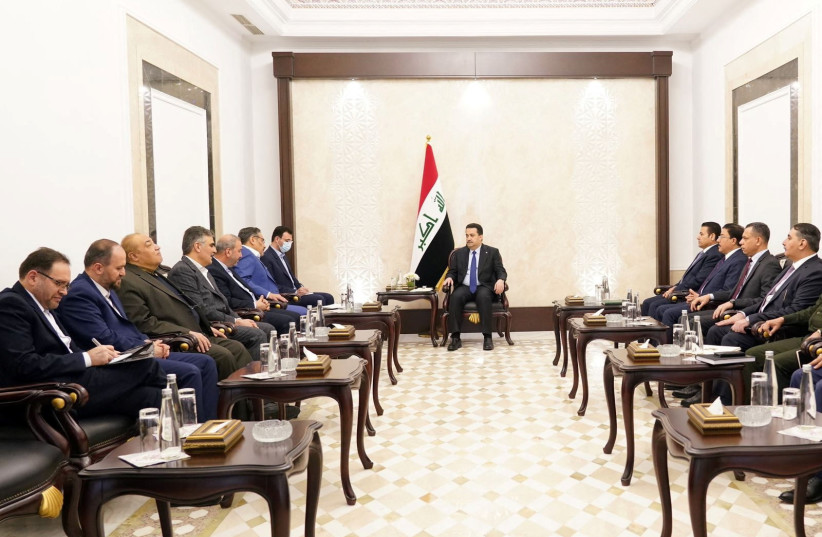Iraq and Iran announced a new security agreement on Sunday meant to tighten control of the border and increase collaboration around security. The deal was signed by Iranian Supreme National Security Council Secretary Ali Shamkhani and Iraqi National Security Adviser Qasim al-Araji. Iraq’s Prime Minister Mohammed Shia’ Al Sudani acted as a witness.
For more stories from The Media Line go to themedialine.org
Under the signed security deal, “Iraq pledges it would not allow armed groups to use its territory in the Iraqi Kurdish region to launch any border-crossing attacks on neighbor Iran,” said an attendee to the signing ceremony, according to the Reuters news agency.
Iran is still a major factor in Iraq's decision-making
Romy Nasr, a security and extremism analyst covering the Middle East and North Africa, told The Media Line that the deal makes clear that Iran is still a major factor in Iraq’s decision-making process.
Nasr attributed that outlook, especially to the Popular Mobilization Forces (PMF), Iraq’s state-sponsored group of militias. “The PMF is becoming strongly embedded within the system, reflecting an Iranian vision toward Iraq and the Levant,” she said.

The PMF is an umbrella organization for several of Iraq’s militias sponsored by the Iraqi government. The organization was founded in 2014 to jointly confront the Islamic State group in Iraq. Most of the militias in the PMF are Shia, many of which are thought to be backed by Iran.
“Looking at how this agreement is promoting a political rapprochement, I surely see a similar approach [to the one] previously implemented [by Iran] in Lebanon via Hizbullah,” said Nasr. Since its founding in 1985, the Lebanese Shia militia Hizbullah has been closely tied to Iran.
Dr. Abdullah Khurram, a geopolitical risk analyst specializing in emerging powers, told The Media Line that Iran’s main security interest is curtailing any threat from the Kurds, the ethnic group based mostly in Turkey, Iran, and Iraq. According to Khurram, the security deal will effectively allow Iran to minimize that threat.
While relations have warmed between Iraq and the Gulf Cooperation Council states – Bahrain, Kuwait, Oman, Qatar, Saudi Arabia, and the United Arab Emirates – Iran has more influence over Iraq than any of those countries do, Khurram said. “This deal will certainly be seen as a win in Tehran,” he added.
Khurram said that Iran cannot afford to let the Iraqi government become anti-Iran and risk returning to a situation like that of the Iran-Iraq War of the 1980s. From the Iranian government’s point of view, he explained, cooperating with Iraq will better allow Iran to address what it sees as the threat of Kurdish violence from across the Iraqi border.
Iran “believes that taking joint action against the Kurds in coordination with Baghdad will also limit the involvement of foreign powers such as the US and Israel, who are widely perceived in Iran to be supporting Iraqi Kurds and igniting tensions in Iran,” Khurram said.
From the Iraqi perspective, Nasr said, the agreement serves both to calm the country’s internal security issues and to gain a better position in the international arena.
Improving its geopolitical position has long been part of Iraq’s agenda, Nasr said, which was especially clear during Al Sudani’s visit to Iran in November 2022. The visit was intended to address multiple issues, including the repeated attacks on Iranian Kurdish opposition groups based in Iraqi Kurdistan.
Besides that, Al Sudani “was also aiming at moving further the peace talks between Iran and Saudi Arabia, placing himself in the role of a mediator, which was already started by his predecessor [former Iraqi Prime Minister Mustafa] al-Kadhimi,” Nasr said. She explained that the eventual success of the talks between Iran and Saudi Arabia placed Al Sudani in a role of influence and power.
“He is looking at achieving a balanced foreign policy by being close to Iran and [Saudi Arabia] while still protecting Iraq’s relations with the US and EU,” Nasr said.
Regional stability is another of Iraq’s geopolitical aspirations, Khurram said, noting that Iraq does not want to remain the battleground for a proxy war between the US and Iran. Iraq “is also interested in widening its defense and security cooperation with countries around the world, including with both the US and Iran,” Khurram said
In the new security deal, Iraq committed not to allow any armed groups to use the territory of its Kurdish region to launch a cross-border attack on Iran. This agreement will allow both countries to better control the threat of Kurdish violence, Nasr said.
The deal will likely lead to increased friction between the Patriotic Union of Kurdistan and the Kurdistan Democratic Party, two groups that have jointly administered the Kurdish region of Iraq since the first Gulf War in 1990.
It will also make it harder for Israel to coordinate with the Kurds, she said. Israel is known to have an unofficial presence in the region.
“Iraq’s Kurdish region hosts camps and rear bases operated by several Iranian Kurdish factions, which Iran has accused of serving Western or Israeli interests in the past,” Nasr explained.
According to Khurram, an additional consequence of the agreement is the likely weakening of Iraq’s Kurdish faction. While Kurdish military forces were previously responsible for managing the border with Iran, in the new agreement, Iraqi federal forces will take over the role, Khurram said.
